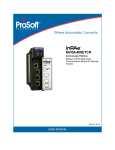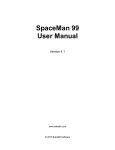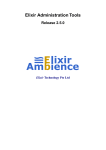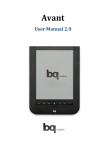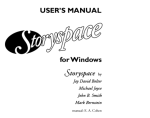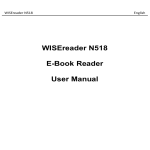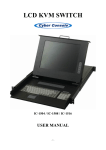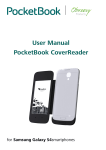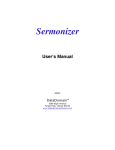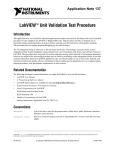Download User Manual
Transcript
User Manual Copyright Copyright 2010. All rights reserved. No part of this publication may be reproduced, transmitted, transcribed, stored in a retrieval system or translated into any language or computer language, in any form or by any means, electronic, mechanical, magnetic, optical, chemical, manual or otherwise, without the prior written permission of this company. Disclaimer This company makes no representations or warranties, either expressed or implied, with respect to the contents hereof and specifically disclaims any warranties, merchantability or fitness for any particular purpose. Further, this company reserves the right to revise this publication and to make changes from time to time in the contents hereof without obligation to notify any person of such revision or changes. Windows is a registered trademark of Microsoft Corporation in the United States and other countries. Others are copyrights of their respective companies or organizations. Safety instructions Before operating this device, please read carefully and follow the instructions below. ● Read the safety and operating instructions carefully before using the product. All warnings on the product and in the operating instructions should be observed. ● Do not place this product under direct sunlight or near heat sources, such as in a closed car under sunlight or near a stove. The outer casing of this product may become deformed and the sophisticated sensors inside may become damaged due to excessive heat. ● Do not use this product near water, in the rain or allow any liquid to get inside this product. Water and moisture may cause short-circuit to the electronic components and lead to malfunctions. ● Do not use this product near strong electromagnetic sources, such as a microwave oven. The electromagnetic interference may cause this product to malfunction. ● Do not drop or apply shock/vibration to this product. Strong impacts may damage the components inside. ● Do not insert objects other than compatible memory cards into the memory card slot of this product. The metal contacts inside the slot can easily become damaged by foreign objects. ● Do not use an unknown power adapter other than the one supplied with this product. Connecting this product to an unknown power adapter is very dangerous and may lead to fire or explosion. ● Do not cut, bend, modify, place heavy objects, or step on the cable of the power adapter. Otherwise the external insulation may be damaged and result in short-circuit or fire. ● If there are strange odors or heat emitting from this product or any signs of malfunction, disconnect this product from the power immediately and contact your dealer for inspection or service. ● Use a smooth, soft cloth to clean the surface of the screen. Do not use liquid cleaners or glass cleaners. ● If a foreign substance or water gets in this product, please turn the power off immediately and disconnect the power adapter. Next, remove the foreign substance or water, if possible, and then send the product to your nearest service center. Do not attempt to disassemble or modify this product. There are no user serviceable parts inside this product, and unauthorized modifications will cause the warranty to void. If the battery is depleted or fails to function properly, send the product to your nearest service center for battery replacement. Do not attempt to replace the battery by yourself. Do not leave this product in Sleep mode for more than 2 weeks as this may cause screen burn-in (permanent image retention caused by still picture displayed for an extended period of time) that can not be recovered. Table of Contents Introduction..........................................................1 Identifying the Parts ............................................................. 2 Front View ......................................................................... 2 Rear View.......................................................................... 5 Getting Started.....................................................6 Charging............................................................................... 6 Powering on Your Device ................................................... 9 To Turn Off Your Device ................................................... 9 Screen Saver Mode and Sleep Mode......................... 10 Inserting a microSD Card .................................................. 12 To Remove the microSD Card...................................... 12 Browsing Files From a microSD Card................................ 13 Operating the Device .......................................15 Navigating the On-Screen Display (OSD) Menus .......... 15 Using the Touch Screen..................................................... 15 Tap ................................................................................... 15 Flip.................................................................................... 16 Screen Orientation ............................................................ 17 Using the On-Screen Keypad ........................................... 17 Using the Main Menu......................................................... 18 Knowing the Mode Functions....................................... 19 Book list Mode ................................................................... 20 Sorting Books................................................................... 22 Reading a Book.............................................................. 22 Selecting a Reading Mode .......................................... 23 Zooming the Contents................................................... 24 Adding a Bookmark or a Note to a Page................... 25 Viewing Bookmarks and Notes..................................... 26 Deleting Boomkarks or Notes........................................ 27 Looking Up Words .......................................................... 28 Searching Words ............................................................ 29 Activating Power Saving Mode ................................... 29 Displaying Table of Contents........................................ 30 Displaying Book Information ......................................... 31 Bookmark Mode ............................................................... 32 Image Mode ..................................................................... 34 Setting the Slideshow Options ...................................... 35 Playing Back a Slideshow.............................................. 36 Zooming the Image ....................................................... 37 Audio Mode ...................................................................... 38 Note: Certain file names may not be shown correctly. 38 Using the Control Panel to Play Back Audio Files....... 39 Internet Mode ................................................................... 41 Connecting to a Wi-Fi Network .................................... 41 Accessing a Web Page ................................................ 48 Settings Mode ................................................................... 51 Orientation...................................................................... 52 Wi-Fi Setting..................................................................... 52 Language ....................................................................... 52 Current Date and Time ................................................. 53 Screen Saver................................................................... 55 Advanced Setting.......................................................... 55 Device Info ..................................................................... 55 Input Method.................................................................. 55 Importing Files from Your Computer ................................ 56 Troubleshooting .................................................58 Product Data ......................................................59 Federal Communication Commission Interference Statement ............................................................................... 59 FCC Caution................................................................... 60 Declaration of Conformity ............................................ 60 Specifications ....................................................62 Introduction Thank you for choosing Smart Reader. Before using this product, please read this User Manual carefully. Your Smart Reader features a 6” touch-sensitive Electrophoretic Display (EPD) panel. You can read books anytime and anywhere, simply by importing your desired books in compatible electronic file formats into your device. It also allows you to view pictures and listen to music or audiobooks through the built-in speakers or the headphones. Furthermore, by connecting the device to a Wi-Fi network, you can download playable files from the Internet. Introduction | 1 Identifying the Parts Front View 1 2 3 4 5 6 7 8 9 10 11 12 No. Description 1 Power switch ● ● Slide and hold the power switch for 5 seconds, and then release it to turn on the device. To turn it off, slide this switch and then tap . To enter Sleep mode, slide this switch at any time and tap . To disable Sleep mode, slide this switch again. 2 |Introduction No. Description 2 Micro USB port ● ● 3 Allows you to connect the device to a computer so the files can be transferred from your computer to the device, and vice versa. Uses to charge the battery of your device. (See page 6) Memory card slot Insert a microSD/microSDHC card into the memory card slot to access book/image/audio files stored on the card. (See page 12) 4 Headphone jack Insert your headphone connector into this jack to listen to the audio files through the headphones. 5 Touch screen Displays information and allows you to perform operations via different gestures. (See page 15) 6 Menu button In Book list, Image or Audio modes, press this button to display the sub-menu. Indicator When tapping anywhere on the touch screen, this indicator lights on. Introduction | 3 No. Description 7 Volume control button 1. Press this button to display the volume control bar. Volume control bar / 2. Press 8 to adjust the volume. Search button Searches for a particular word used in a book. (See page 29) 9 Refresh button Reloads the current page to remove after-images after reading many pages continuously. 10 Previous/Volume down button Returns to the previous page/item or turns the volume down. 11 Return button Returns to the last viewed page or the main menu on the Home screen. 12 Next/Volume up button Proceeds to the next page/item or turns the volume up. 4 |Introduction Rear View 13 14 No. 13 Description Reset button Use a pointed object, such as a pin, to push against this button to reset your device when it does not respond to any operations. 14 Speakers Built-in speakers for playing sounds. Press and then volume of the speakers. / to adjust the Introduction | 5 Getting Started Charging Your device is only partially charged when first unpacked. Charge the battery before using the device. 3 1 2 1. Insert the micro USB cable’s Type A USB connector into the power adapter's Type A USB port. 2. Insert the cable’s micro USB connector into the device's micro USB port. 3. Plug the power adapter into a power outlet. The Battery icon appears on the screen indicating charging that the battery is charging now. 6 |Getting Started 4. After the battery is fully charged (around 4 hours), the Battery full icon appears on the screen. Remove the power adapter and the cable from both the power outlet and the device. Note: ● ● For the first time use, charge the device for 8 hours for its optimal performance. You can also charge the device by connecting it to a computer. The status of the battery power is displayed on the top right corner of the screen. Battery is charging. Battery full. Battery status: The fewer bars on the battery icon, the lower the battery power remains. Battery is depleted. Charge the battery immediately. Getting Started | 7 Battery Maintenance This device contains a built-in Li-Polymer rechargeable battery. The capacity of the battery will reduce each time it is charged/depleted. However, you can still try to prolong the battery’s lifetime by following the suggestions below: Use the device at least once a week. Charge the battery regularly and fully. Never leave the battery fully discharged for a long time. ● Always keep the device and the battery away from heat. If the device will only work when the power adapter is connected, contact your local dealer to replace the battery. ● ● Do not try to replace the battery by yourself. Any attempt to disassemble the device may cause damages to the device or result in personal injuries. 8 |Getting Started Powering on Your Device Slide and hold the power switch for 5 seconds, and then release it to turn on the device. A start-up screen appears before entering the main menu on the Home screen. To Turn Off Your Device Slide the power switch the device off. and then tap to turn Getting Started | 9 Screen Saver Mode and Sleep Mode Screen Saver Mode Your device enters Screen Saver mode when idled for a period of time. Tap anywhere on the screen to return to the currently-viewed page. To set up the time duration before entering Screen Saver mode, go to Settings Screen Saver. (See page 55) 10 |Getting Started > Sleep Mode Slide the Power switch to resume. Your device enters Sleep mode after idled in Screen Saver mode for 3 minutes, or you can slide the power switch at any time and tap to enter Sleep mode. To disable Sleep mode, slide the power switch again. Note: Do not leave the device in Sleep mode for more than 2 weeks as this may cause screen burn-in (permanent image retention caused by still picture displayed for an extended period of time) that can not be recovered. Getting Started | 11 Inserting a microSD Card Insert the entire microSD card into the microSD card slot until it locks into place. Ensure that the card’s metal contacts face downwards. To Remove the microSD Card Press on the microSD card to release the card. Note: Supported memory card types: microSD/ microSDHC. 12 |Getting Started Browsing Files From a microSD Card You can use the device to browse or play back your personal book/image/audio files stored on a microSD card. 1. Insert a microSD card into your device’s microSD card slot with the metal contacts facing downwards. 2. Insert the micro USB cable’s micro USB connector into the device’s micro USB port. 3. Insert the cable’s Type A USB connector into a computer’s Type A USB port. Tap when prompted to use the device as a mass storage. The microSD card inserted into your device will be recognized by your computer as a removable drive (Windows systems). 3 2 Getting Started | 13 4. On the computer, copy desired book/image/audio files from another drive/folder to the removable drive. Warning: Do not remove the microSD card from the device or break the USB connection while copying files. 5. When done, remove the cable safely from both the device and the computer. The copied files will be recognized and re-arranged accordingly under Book list/Image/Audio modes. 6. Go to Book list , Image or Audio modes to read books, view images or listen to audio files you just copied. Note: Do not remove the microSD card from your device at any time if you want the device to keep track of the bookmarks/notes added in your book files. 14 |Getting Started Operating the Device Navigating the On-Screen Display (OSD) Menus To operate the device, follow the On-Screen Display (OSD) menus and the tool bars on the sides to complete the tasks. Most of the operations can be done using the touch screen, while some basic functions or hidden menus can be operated through the buttons. Using the Touch Screen Tap Use your finger to touch the surface of the touch screen to select an item or perform a function. Operating the Device | 15 Flip When in Book list or Image mode, place your finger on the left or upper side of the touch screen and gently drag your finger to the right or lower side to turn a page forward or view the next image. To turn to the previous page or view the previous image, flip in the opposite direction. a Or b Note: The (b) flipping method is not available when viewing images. 16 |Operating the Device Screen Orientation For optimal viewing experience, you can set the screen orientation to change automatically to portrait or landscape view depending on how you hold the device. Select Settings > Orientation > Auto. For more settings, refer to page 52. Using the On-Screen Keypad Tap the letter buttons on the on-screen keypad to enter your desired texts. Switch between upper/lower cases. Switch among number/ symbol input methods. Delete a character. Switch among different input methods. Insert a line feed. Operating the Device | 17 Using the Main Menu Upon powering on the device, you will enter the main menu on the Home screen. ● To select a desired mode, tap its icon. To return to the main menu at any time, press the Return ● button repeatedly. If at least one book is read, the last-read book title will ● be shown on the main menu. Tap or the book title to continue reading. Tap to continue reading from your lastread book. 18 |Operating the Device Knowing the Mode Functions The main functions of your device are scheduled under 6 modes, including: Book list, Bookmark, Image, Audio, Internet and Settings. Refer to the below table for a summary of what the device can do in each mode. Icon Mode and description Book list mode Read novels, textbooks, magazines, newspapers or personal documents in compatible formats in various reading modes. ● Add bookmarks or notes while reading. ● Look up words in the pre-installed English to Traditional Chinese dictionary. ● Bookmark mode View the pages with your bookmarks or notes. Image mode View pictures or images in compatible formats in single view or in a slideshow. Audio mode Play back music, speeches or audiobooks in compatible formats. Internet mode Access the Internet and download playable files from web pages through a Wi-Fi connected network. Settings mode Sets up Wi-Fi connection, screen saver interval and other device-related settings, such as OSD language and date/time. Operating the Device | 19 Book list Mode Tap to enter Book list mode and the Book list appears on the screen. The contents stored in the internal memory as well as on the inserted microSD card will both be shown on the Book list. Sorting options (See page 22) File source, book name and author Appears when the book has bookmarks or notes. Current / total page number Last read book Appears only when one book is read. Tap to continue reading. Current sorting method Reading status bar Show/hide the complete menu Note: ● ● will only appear in the Book list after bookmarks or notes are added. The default Book list is subject to change. 20 |Operating the Device Using the Sub-Menu When reading a book, press the Menu display the sub-menu. Icons button to Description See page Add notes. 25 Add bookmarks. 25 Go to the bookmark/note list in a book. 26 Look up words in the pre-installed dictionary. 28 Display the book information. 31 Jump to a specific page. 22 Display the book’s table of contents. 30 Select a reading mode. 23 Enable Power Saving mode. 29 Operating the Device | 21 Sorting Books Tap to select sorting options of the Book list. You can sort books by download date, title, author and publication date. The Book list will be re-arranged by your selected sorting method. Reading a Book 1. Tap the title of a desired book in the Book list. The first or last-read page of the book will appear on the screen. 2. Tap to read the book in full screen. 3. To turn the pages: a. Press / or use your finger to turn the pages (See page 16). 22 |Operating the Device b. Press the Menu button to open the sub-menu. Tap and enter the desired page you want to read by tapping the on-screen number buttons. Tap to confirm inputs and jump to the selected page. 4. When finished reading, press to close and leave the book. Your device will remember your last read page of the book and display your reading status bar on the Book list. Selecting a Reading Mode You can select a page layout to best suit your reading needs. (Supported file format: .pdf) 1. When reading a book, press the Menu open the sub-menu and tap button to . 2. Tap to select a desired reading mode: • : Fit to Page (single page at a time) • : Continuous (continuous pages) • : Reflow (reformatting and separating texts from graphics) 3. When done, tap to confirm selection. Operating the Device | 23 Zooming the Contents 1. When reading a book, tap current page. 2. Tap ratio. / 3. Tap / / want to see. to zoom in on the repeatedly to adjust the zooming / to move to the particular part you 4. To view the close-up in full screen, tap tap size. . Or, to return to the current page in its original 24 |Operating the Device Adding a Bookmark or a Note to a Page You can add a bookmark or write a note on the page you may constantly refer to. When reading a book, press the Menu open the sub-menu. button to Adding a Bookmark Tap to add a bookmark to the current page. The page will be marked by . Operating the Device | 25 Adding a Note 1. Tap to add a note to the current page. 2. Enter the contents by tapping the letter buttons on the on-screen keypad. 3. When done, tap be marked by to confirm inputs. The page will . Viewing Bookmarks and Notes To view the bookmarks and notes added to the book, press the Menu tap a list. button to open the sub-menu and . The pages with bookmarks or notes will appear in 26 |Operating the Device Display options of the pages with bookmarks or notes Contents of notes added to the pages Preview contents of the pages with bookmarks Tap to select display options of the bookmark/note list, including show bookmarks by page, show notes only or show all items. To read the contents in full screen, tap the desired item. Deleting Boomkarks or Notes Deleting Bookmarks 1. Turn to the page with the bookmark you want to delete. 2. Press the Menu from the page. button and tap to remove it Operating the Device | 27 Deleting or Modifying Notes 1. Turn to the page with the note you want to delete or modify. 2. Tap to open the note-editing box. 3. To modify the note, tap to open and use the on- screen keypad for text editing. When done, tap to confirm inputs. To delete the note, tap . Note: To view only the pages with bookmarks or notes from books on the Book list, go to Bookmark mode (See page 32). Looking Up Words The device provides a pre-installed English to Traditional Chinese dictionary that allows you to view the definitions of words when reading a book. 1. When reading a book, press the Menu open the sub-menu. 2. Tap button to to display the Word Lookup box. 3. Tap a word and its lookup result appears in the Lookup box. 4. When done, tap 28 |Operating the Device to leave. Searching Words The device allows you to search for a particular word used in a book. 1. When reading a book, press the Search open the Keyword Search box. button to 2. Enter a word using the on-screen keypad. 3. When done, tap and its search results appear in a list of sentences containing the searched word and their page numbers. Press / to go through the list, if available. 4. To read the complete contents of this page, tap the desired sentence/page number, or press leave the Search Results page. to Activating Power Saving Mode When reading books, you can enable Power Saving mode to last longer of your reading time. However, the speed of turning pages will slow down. 1. When reading a book, press the Menu open the sub-menu. button to 2. Tap to enable Power Saving mode and the icon appears on the top right corner of the screen. To disable Power Saving mode, tap . Operating the Device | 29 Note: ● When Power Saving mode is enabled, certain functions will become limited or unavailable: - the screen orientation is fixed to Portrait view only. - the Refresh disabled. ● / Volume control buttons are When below functions are operated, Power Saving mode will become disabled: - the device is connected to power or to a computer. - the device is connected to a Wi-Fi network. - the device is playing an audio file. Displaying Table of Contents You can view a book’s table of contents (TOC) before starting to read the contents. 1. When reading a book, press the Menu open the sub-menu. button to 2. Tap . The book’s TOC is re-arranged in a list of chapters and topics with corresponding page numbers to the left. Press / to go through pages and tap a desired item to jump to its corresponding page. 30 |Operating the Device Note: This function is available only when the book contains a TOC created with hyperlinks. Displaying Book Information 1. When reading a book, press the Menu open the sub-menu. button to 2. Tap to display the book’s basic information, such as the file name, author and file date. Operating the Device | 31 Bookmark Mode The Bookmark list contains all the bookmarks and notes you’ve added to all the books on your Book list. Tap to enter Bookmark mode and the Bookmark list appears on the screen. Note: Only books that contain bookmarks or notes will appear on the Bookmark list. Sorting options of the book list Numbers of bookmarks and notes added to the book 1. Tap a book to view the pages with bookmarks and notes. 32 |Operating the Device 2. Tap to select display options of the bookmark/ note list. You can show bookmarks by page, show notes only or show all items. To read the contents in full screen, tap the desired item. Display options of the pages with bookmarks or notes Contents of notes added to the pages Preview contents of the pages with bookmarks Operating the Device | 33 Image Mode Tap to enter Image mode and the Image list appears on the screen. The images stored in the internal memory as well as on the inserted microSD card will both be shown on the Image list. Tap to sort the Image list by file name or by the file’s last-modified/download time. Starts a slideshow. Sorting options of the Image list The thumbnail of the image Sets up slideshow playback options. Current sorting method Image file name and its lastmodified/ download time. Press / to go through pages of images, if available. Tap a desired image to view it in full screen. Note: Certain file names may not be shown correctly. 34 |Operating the Device Setting the Slideshow Options 1. On the Image list page, tap to display the slideshow setting options. 2. Tap / to set the slideshow interval. 3. Tap to enable slideshow playback repetition and background music. 4. Tap and select an audio file as the background music during slideshow playback. 5. When done, press page. to go back to the Image list Operating the Device | 35 Playing Back a Slideshow You can view images on the Image list as a slideshow in 2 ways. ● In Image mode, tap to start a slideshow of all the images in the Image list. ● When viewing a image in full screen, press the Menu button to open the sub-menu. Tap to start a slideshow from the current image. During a slideshow, you can still adjust the time interval between slides. Tap anywhere on the touch screen to pause slideshow playback and display the toolbar. When you’re done with the settings, tap to resume slideshow playback. Adjusts the time interval between slides. Starts a slideshow from the current image. Zooms in/out on the current image. 36 |Operating the Device Returns to the single image view. Zooming the Image 1. When viewing an image in full screen, press the Menu button to open the sub-menu. 2. Tap to zoom in on the current image. 3. Tap / 4. Tap / / want to view. repeatedly to adjust the zooming ratio. / to move to the particular part you Starts a slideshow from the current image. Adjusts the zooming ratio of the image. 5. To view the image in its original size, tap until disappears, or press Image list. repeatedly to return to the Operating the Device | 37 Audio Mode Tap to enter Audio mode and the Track list appears on the screen. The audio files stored in the internal memory as well as on the inserted microSD card will both be shown on the Track list. Press / to go through pages of audio files, if available, and tap a desired track to start playback. To stop playback, tap the current playback track again. Appears when playback of this track starts. Note: Certain file names may not be shown correctly. 38 |Operating the Device Using the Control Panel to Play Back Audio Files Playback control panel Play mode control Playback control Volume control Playback Control ● ● Tap / to select a desired track and tap to start playback. During playback, tap playback. / to pause/stop Operating the Device | 39 Play Mode Control ● ● ● Tap / / repeatedly to select a desired play mode: one track only once, one track repeatedly or all tracks repeatedly. Tap / repeatedly to disable/enable playback in random order. Tap / repeatedly to select to play back one track/all tracks once only. Volume Control ● ● Tap / to turn the volume down/up. Tap to mute the sound. Tap it again to resume normal playback. 40 |Operating the Device Internet Mode Tap to access the Internet and download playable files. Before logging on to the Internet, you need to connect the device to a Wi-Fi network first. Connecting to a Wi-Fi Network 1. Tap and then to enter Settings mode. 2. Tap Wi-Fi Setting to enter the Wi-Fi setting page. Operating the Device | 41 3. Tap to turn the Wi-Fi on. The device scans for available wireless networks. The network names (SSID) and security settings of discovered Wi-Fi networks display in a list. Tap to set up its network setting. Wi-Fi network list Wi-Fi signal strength This Wi-Fi network is secured. a. If your desired network is in the list, continue to Step 4. 42 |Operating the Device b. If your desired network is not in the list, tap . Text input box Tap / to select the security type of your desired Wi-Fi network. Tap the text input box and enter the name and password, if needed, for the network using the onscreen keypad. When done, tap to confirm inputs. If the hidden network is discovered, its name will be added onto the Wi-Fi network list with its signal strength displayed as . Operating the Device | 43 4. If your desired Wi-Fi network is not secured, you can: a. Tap the desired Wi-Fi network to start connection. b. Tap the Setup icon next to your desired Wi-Fi network. Its network name and network setting information then appears on the screen. Configure the initial IP address in the following ways: • DHCP (Dynamic Host Configuration Protocol): the device automatically obtains an IP address from the DHCP server. 44 |Operating the Device • Static IP: Assigns a set of IP address, Subnet Mask, IP address of the gateway router and IP address of the DNS server. Tap the number input box and use the on-screen keypad to enter its figures. When done, tap to confirm inputs. To save the inputs, tap . Number input box When done, Tap to confirm connection. Operating the Device | 45 5. If your selected network is secured, you will be requested to enter its password. Use the keypad to enter the password, and tap and start connection. 46 |Operating the Device to confirm inputs 6. After the device connects successfully to the Internet, an icon appears next to the connected network. The icon also appears on the top right corner of the screen indicating the current Wi-Fi signal strength. 7. Tap to enter Internet mode. The default web site list then appears on the screen. Tap a link to enter its web site. Now you are ready to access the Internet. Operating the Device | 47 Accessing a Web Page Upon entering Internet mode, the default web site list appears on the screen. You can tap to visit a web site directly, or enter a URL for a web site to view by yourself. 1. Tap the URL input box. 2. Use the on-screen keypad to enter the URL for your desired web site. When done, tap inputs. to confirm URL input box 3. After a few seconds, the web page appears on the screen. 48 |Operating the Device Browsing a Web Page b (Web page contents) c d a Scroll bar a. To view the complete content of the web page, tap the scroll bar on the sides to move through the page. b. To go to the previous or next web page, tap or . To stop loading or to reload the current page, tap current page, tap or . To zoom in or out the or . c. To enter texts when browsing a web page, for example, keywords for a search box, tap the text input box to display the on-screen keypad. Use the keypad for text inputs. Operating the Device | 49 d. To navigate the hyperlinks on the web page, directly tap the hyperlinks, shown mostly as underlined words. Downloading a File To save or download a playable file from a web page, tap the “Save”, “Download” or similar buttons or links. The downloaded file will be stored and re-arranged accordingly under Book list/Image/Audio modes. Note: The device can only download playable files from the Internet. For supported file types, refer to page 62. 50 |Operating the Device Settings Mode Settings mode allows you to set up Wi-Fi connection, screen saver time interval and other device-related information, such as OSD language and date/time. Tap and then to enter Settings mode. Tap to select an option. Show/hide the complete menu. Operating the Device | 51 Orientation Sets the screen orientation to portrait view, landscape view or to switch between two views automatically depending on how you hold the device. ● Auto: ● Portrait: ● Landscape: Wi-Fi Setting Enables Wi-Fi. Refer to “Connecting to a Wi-Fi Network” for detailed operations (See page 41). Language Selects your local OSD language. 52 |Operating the Device Current Date and Time Sets up your local date and time. Downloaded files will be saved according to the date and time set on your device. ● To adjust the date, tap . Tap the year/month/date columns to be adjusted and tap / to adjust the figures. The year/ month/date columns Operating the Device | 53 ● To adjust the time, tap . Tap the hour/minute columns to be adjusted and tap / to adjust the figures. The hour/minute columns When done, tap to save selection and leave the setting. To leave without saving any changes, tap 54 |Operating the Device . Screen Saver Sets up the time duration before entering Screen Saver mode. Tap to turn on this function and tap a desired time duration. Advanced Setting Restore Defaults Restores your device to factory default settings. However, your bookmarks/notes and device settings will be lost. Perform necessary backup actions, for example, taking notes on a paper, before restoring your device. Device Info Displays the device’s technical information. Input Method Selects your desired input methods when you input texts. Operating the Device | 55 Importing Files from Your Computer You can import your personal book/image/audio files from your computer to the device for playback needs. 1. Insert the micro USB cable’s micro USB connector into the device’s micro USB port. 2 1 2. Insert the cable’s Type A USB connector into your computer’s Type A USB port. 3. Tap when prompted to use the device as a mass storage. The device will now be recognized by your computer as a removable drive (Windows systems). 56 |Operating the Device 4. On the computer, copy desired book/image/audio files from another drive/folder to the removable drive. Warning: Do not break the USB connection while copying files. 5. When done, remove the cable safely from both the device and the computer. The copied files will be recognized and arranged accordingly under Book list/ Image/Audio modes. Operating the Device | 57 Troubleshooting Problem: The screen contains after-images left from the last-viewed page or photo. Solution: Reading many pages continuously at one time may cause such permanent image retention. To remove after-images, press the Refresh button to reload the current page. To avoid such effect from happening, do not leave a still picture or page displayed for an extended period of time. Problem: The device does not respond to any operations. Solution: • An internal error may occur. Use a pointed object, such as a pin, to push against the Reset button to reset your device. • The battery is depleted. Charge the device first. Problem: Your computer does not detect your device when connected. Solution: • Check if the micro USB cable is connected firmly onto both the device and your computer in the correct way. • Remove the micro USB cable, and then reconnect the device onto your computer using the micro USB cable. 58 |Troubleshooting Product Data Federal Communication Commission Interference Statement This equipment has been tested and found to comply with the limits for a Class B digital device, pursuant to Part 15 of the FCC Rules. These limits are designed to provide reasonable protection against harmful interference in a residential installation. This equipment generates, uses and can radiate radio frequency energy and, if not installed and used in accordance with the instructions, may cause harmful interference to radio communications. However, there is no guarantee that interference will not occur in a particular installation. If this equipment does cause harmful interference to radio or television reception, which can be determined by turning the equipment off and on, the user is encouraged to try to correct the interference by one of the following measures: ● ● ● ● Reorient or relocate the receiving antenna. Increase the separation between the equipment and receiver. Connect the equipment into an outlet on a circuit different from that to which the receiver is connected. Consult the dealer or an experienced radio/TV technician for help. Product Data | 59 For product available in the USA/Canada market, only channel 1~11 can be operated. Selection of other channels is not possible. FCC Caution Any changes or modifications not expressly approved by the party responsible for compliance could void the user’s authority to operate this equipment. This device complies with Part 15 of the FCC Rules. Operation is subject to the following two conditions: (1) This device may not cause harmful interference, and (2) this device must accept any interference received, including interference that may cause undesired operation. This device and its antenna(s) must not be co-located or operating in conjunction with any other antenna or transmitter. Declaration of Conformity This product is in compliance with the essential requirements and other relevant provisions of Directive 2004/ 108/EC and 1999/5/EC: European Standard ETSI EN 300 328 V1.7.1 (2006-10), EN 301 489-1 V1.8.1 (2008-04), EN 301 489-17 V1.3.2 (2008-04), EN55022:2006 Class B, EN61000-3-2:2006, EN61000-3-3:1995/ A1:2001/A2:2005 and EN55024:1998/A1:2001/A2:2003 (IEC 61000-4-2:Edition 1.2:2001-04, IEC61000-4-3:Edition 2.1:200209, IEC61000-4-4:Second edition:2004-07, IEC61000-45:Edition 1.1:2001-04, IEC 61000-4-6:Edition 2.1:2004-11, IEC61000-4-8:Edition 1.1:2001-03, IEC 61000-4-11:Second 60 |Product Data Edition:2004-03) and Australian Standard AS/NZS CISPR 22:2006 Class B. This device is a 2.4 GHz wideband transmission system (transceiver), intended for use in all EU member states and EFTA countries, except in France where restrictive use applies. This device may not be used for setting up outdoor radio links in France and in some areas the RF output power may be limited to 10 mW EIRP in the frequency range of 2454-2483.5 MHz. For detailed information the end-user should contact the national spectrum authority in France. Product Data | 61 Specifications Specifications are subject to change without prior notice. Item Description Product Name e-Reader Screen Size 6” Aspect Ratio 4:3 Touch Film Capacitive touch Grey Level Memory 16 gray levels Mobile DDR 128 MB NAND Flash 2 GB Micro USB USB 2.0 Device SD slot microSD/microSDHC card slot Earphone jack Yes Audio Built-in Speakers Yes Battery Built-in Battery 1530 mAh Connector Power Input DC 5 V 1 A Connectivity Wi-Fi b/g 802.11 b/g OS Linux V 2.6.21 Supported Memory Card Types 62 |Specifications microSD, microSDHC Item Supported File Formats Description Text .pdf, .html, .txt, .epub Image .jpg, .png, .bmp Audio .mp3 ● System Requirements (for Computer) ● Operating System: Microsoft® Windows® 2000, XP and Windows Vista™ USB port: an available USB 1.1 or 2.0 port Specifications | 63







































































